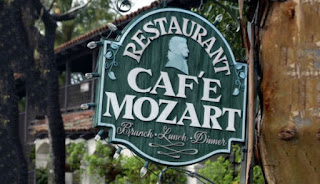Dining Club (1) - Le Gourmet Toastmasters Club (Founder's District)

This is a club chartered in 1978 that meets monthly at a different restaurant in Southern California. It belongs to the "Founder's District" as Orange County is where Toastmasters International started, and where the headquarter used to be before 2019. I was a member of this club, and it was my annual anticipation for the year-end visit to Cafe Mozart, an European Bistro in San Juan Capistrano. Le Gourmet Toastmasters Club has a core group of members who are current or past District Officers. Although it never says so, it feels like an advanced club when you speak among so many DTMs. The special meeting arrangements of Le Gourmet Toastmasters Club are: 1. Restaurant Selection The cuisine selections are never boring: Italian, Japanese, Korean, Indian, Mexican, Chinese, European, Mediterranean, Hawaiian, Peruvian, Thai, BBQ, ... you name it. The officers did their best to negotiate the menu within a reasonable of price and variety to cater for special diet needs (e.g. veg...


